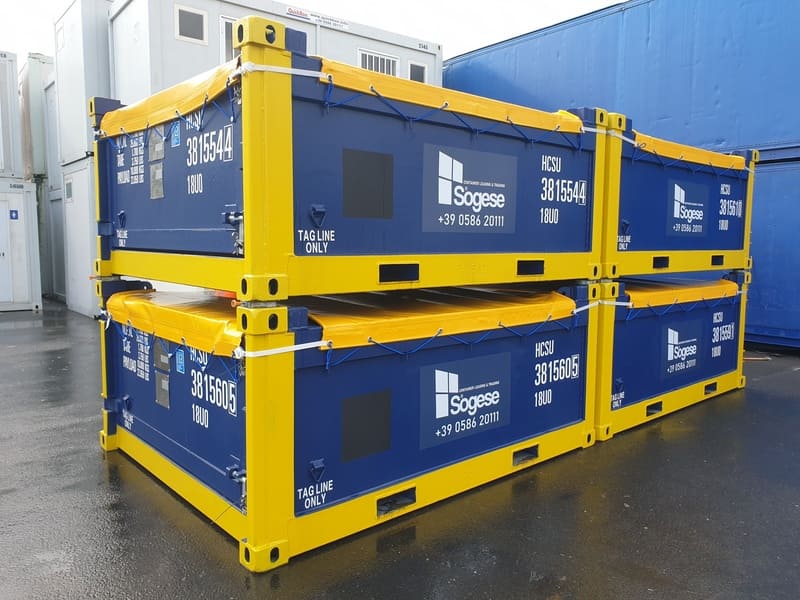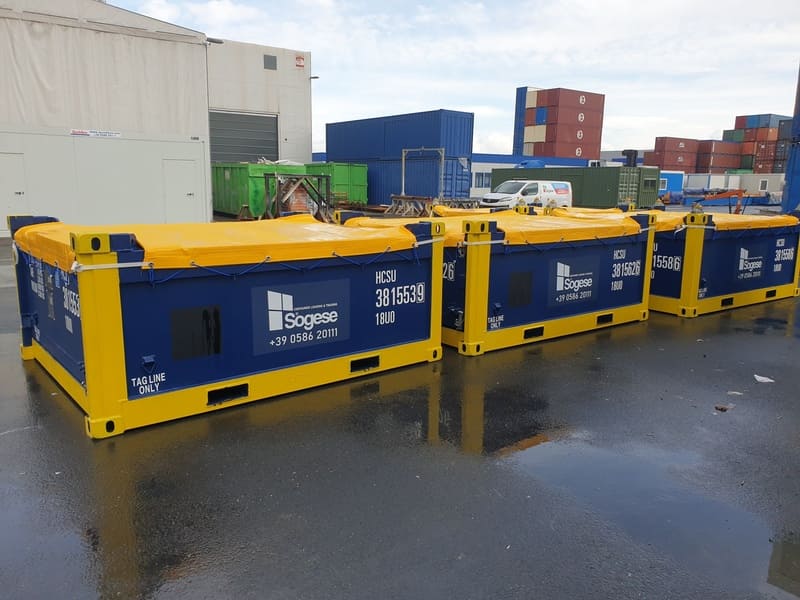DNV 2.7-1 certification for containers: a SO.GE.SE guide.
Introduction to the value of DNV 2.7-1 certification for containers
In the world of industrial logistics, offshore transport and oil & gas operations, safety and compliance with international standards are paramount. Containers are not simply “metal boxes” but engineered assets that must withstand extreme conditions and ensure the protection of cargo and personnel. In this context, DNV 2.7-1 certification is an essential standard for containers intended for offshore use, guaranteeing robustness, safety and durability.
With this article, we at SO.GE.SE. look in detail at what it is, why it is important and how to recognise a certified container.
What is DNV 2.7-1 certification?
DNV (Det Norske Veritas) is one of the world’s leading maritime and industrial certification bodies, with headquarters in Norway and global operations. Established in 1864, DNV is responsible for developing technical standards, carrying out inspections and certifying industrial, marine and offshore assets, ensuring that they are designed and built in accordance with international safety regulations.
The DNV 2.7-1 certification is a technical standard specifically for offshore containers. Introduced in 1987 and continuously updated, it defines the minimum design, manufacturing and inspection requirements for containers used in offshore operations. The standard covers aspects such as:
- Structural integrity (resistance to impact, dynamic and static stress)
- Lifting safety (tests on lifting points and slings)
- Corrosion resistance (materials and treatments)
- Stability and safety during transport by sea, on platforms or ships
Why DNV 2.7-1 certification is important for containers
DNV 2.7-1 certification is not just a “vignette”, but a concrete guarantee of quality and safety. The main reasons can be summarised in these points:
- Personnel safety: prevents accidents related to structural failure during offshore lifting or handling operations.
- Cargo integrity: protects sensitive equipment or hazardous materials during transport on platforms or ships.
- Regulatory compliance: meets legal requirements and international standards for offshore operations.
- Reliability in extreme conditions: withstands wind, waves, shocks and marine corrosion.
- Reduced operational risk: avoids downtime and costly damage due to inadequate containers.
- Standardisation: simplifies inspection, acceptance and handling procedures internationally.
- Commercial value: certified containers maintain a higher market value, being universally recognised and accepted.
Technical characteristics of a DNV 2.7-1 certified container
 A DNV 2.7-1 container is characterised by its robustness and attention to construction details. It is made of reinforced structures and corrosion-resistant materials such as treated steel and special paint. All lifting points and slings are dimensioned and tested for dynamic and static loads, ensuring safety when lifting with cranes at sea.
A DNV 2.7-1 container is characterised by its robustness and attention to construction details. It is made of reinforced structures and corrosion-resistant materials such as treated steel and special paint. All lifting points and slings are dimensioned and tested for dynamic and static loads, ensuring safety when lifting with cranes at sea.
Panels and welds are subjected to non-destructive testing, while the design must comply with precise load and stability analyses.
In addition, technical documentation accompanies the container throughout its life cycle, facilitating periodic inspections and scheduled maintenance.
Differences between a standard container and a DNV 2.7-1 container
Standard ISO containers are designed for land and sea transport under conventional conditions, while DNV 2.7-1 containers are designed for offshore environments. The main differences lie in structural strength (much higher in DNVs), corrosion protection (special paints and steels resistant to the marine environment), lifting systems (certified slings, reinforced corners) and mandatory tests. An ISO container may be unsuitable or even banned for offshore operations, whereas DNV 2.7-1 is specifically approved for these applications. The cost is also higher for DNV, justified by the increased safety and longevity.
Conclusioni e il ruolo di SO.GE.SE.
 In conclusion, DNV 2.7-1 container certification represents an essential standard for those operating in the offshore and oil & gas sectors, guaranteeing superior safety, quality and reliability compared to traditional containers. In an industry where every detail counts, choosing certified containers means protecting people, assets and investments, ensuring compliance with international regulations and business continuity even in extreme conditions.
In conclusion, DNV 2.7-1 container certification represents an essential standard for those operating in the offshore and oil & gas sectors, guaranteeing superior safety, quality and reliability compared to traditional containers. In an industry where every detail counts, choosing certified containers means protecting people, assets and investments, ensuring compliance with international regulations and business continuity even in extreme conditions.
In this context, we at SO.GE.SE. position ourselves as a trusted partner for all container-related needs, offering a complete range of DNV 2.7-1 certified solutions, ideal for oil & gas platform logistics. We have both refrigerated and DNV 2.7-1 certified shipping containers, designed with reinforced structures and corrosion-resistant materials to ensure maximum safety, durability and performance on platforms, ships and petrochemical plants.
We offer different sizes and configurations that can be customised to meet every operational need. In addition, we provide qualified technical service, in-house workshops for modifications and repairs, and an extensive logistics network throughout Italy. Thanks to our experience and daily commitment, we accompany our customers in every phase of the project, transforming their needs into concrete and safe solutions. Contact us now for more information!